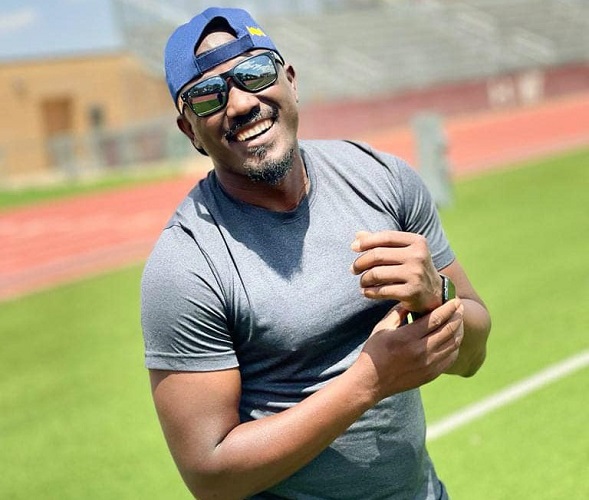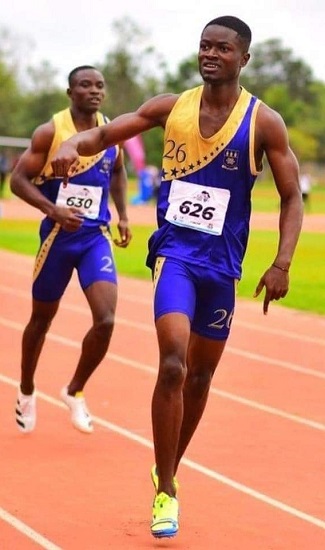US-based athletics coach tips new sensation James Dadzie for greatness
Ghanaian athletics coach Elorm Amenakpor has predicted a bright future for sprints sensation, James Dadzie, saying the youngster has the potential to run even faster and break more records if he remained focused, disciplined, worked even harder and did not get carried away by his recent feats in US collegiate athletics.
Last week Dadzie ran a blistering 19.79 seconds over 200 metres at the Crofoot Shootout in Lubbock, Texas, to set a new Ghana record as he obliterated the existing mark of 20.08 seconds set in 2019 by US-based Joseph Paul Amoah.
On that historic day, the athlete ran an amazing 9.89 seconds over 100m albeit under illegal wind conditions (+3.2), which means it was not recognised as a new national record but was still a personal best and a school record at Western Texas College where the Ghanaian is a freshman.
Coach Amenakpor believes Dadzie has the potential to lower his time even further and ran 19.60 or 19.50 seconds over the distance if he continues to work hard and progress the way he is going.
In accomplishing that feat, the 22-year-old Dadzie became the first Ghanaian to run under 20 seconds over the distance. It was also a school record at Western Texas College and then the fastest time run over the distance in the world so far this year.

For coach Amenakpor who helped to hone the youngster’s talents at the University of Ghana and helped him to move to the USA in January, Dadzie’s exploits are remarkable as his career has seen a big turnaround over the last four months.
And having watched his career trajectory since his time at Aggrey Memorial AME Zion SHS in the Central Region of Ghana, Coach Amenakpor is confident the sprinter has age on his side to improve year on year and become a big deal in athletics, as he has a good coach and the support system in the USA to aid his development as an athlete.
Amenakpor, who is currently a volunteer assistant sprints coach at the West Texas A&M University where he is pursuing a Master’s degree in Sports and Exercise Science, told the Graphic Sports in an interview that his protégé has a potential for greater exploits in the tracks.
“He’s very young, just 22 years, so there’s a lot of room for improvement. I hope the country [Ghana] will assist him and other sprinters to get into camp and train together and he’ll be ready to get into the semi-finals or finals of major international competitions.
“He can still run fast. He came here in January and he’s managed to shave off 0.39 seconds off the existing record. That’s huge and it shows that he can run even faster if he remains focused, disciplined and listens to his coach,” said the Ghanaian coach who also works with some of Ghana’s other sprinters, particularly national 100m record holder Benjamin Azamati.
He knows the perils of achieving such remarkable feats very early in the careers of athletes and the weight of expectation they carry, hence his advice to Dadzie to keep his head up as he continues his development.
“He should not get carried away but relax and go out there and do what he knows best. He needs to not put pressure on himself to prove people wrong because it can affect him psychologically and could even lead to injuries,” advised the coach.
Despite his early success in US collegiate athletics, the Ghanaian coach believes Dadzie has a lot of work ahead on his technique and physical conditioning to become the real deal.
“James has to improve in the area of getting out of the blocks, staying down in the drive phase for longer time and also get his upper body relaxed while running.”

On the recommendation of Coach Amenakpor, Dadzie was granted a sporting scholarship by Western Texas College and put under the tutelage of American sprints coach, James Williams, the man who helped Ghanaian sprinter Janet Amponsah break the national women’s 200m record in 2018.
Dadzie said in an interview on TV3 that his American trainer has helped improve some of his flaws through improved training methods, such as running with a better posture and improvement in his reaction time, so he was looking forward to farther improvement.
“I was a poor starter in Ghana but since I got here in the USA, my coach has corrected that error so I can react to the gun better,” he said.
“Also, unlike Ghana where we have not more than three competitions in a year, here in the US we have a lot of competitions so it helps us improve better.”
Now The youngster arrived at the Western Texas College in January this year with a personal best of 10.65sec over 100m and 21.07 sec in 200m, but in just four months, he is running sub-10 seconds in the shorter prints and not holds a national record and world leading mark in the 200m with a great potential to run even faster.
Coach Amenakpor admits also that, aside top class facilities and coaching, regular competitions in the US account for the fast improvement of Ghanaian athletes when they relocate to the USA.
“Unlike Ghana, athletes compete every blessed week during the athletics season. Every week there’s a competition and that’s how come that our athletes who get here and are focused, disciplined and take their training and academic work seriously are able to do well.
“It’s not that our coaches are not good but it’s because we don’t have the necessary infrastructure and regular competition to get our athletes to progress because the
highest intensity of training is during competitions. You can train everyday but if you don’t get competitions you don’t improve,” he told the Graphic Sports.
